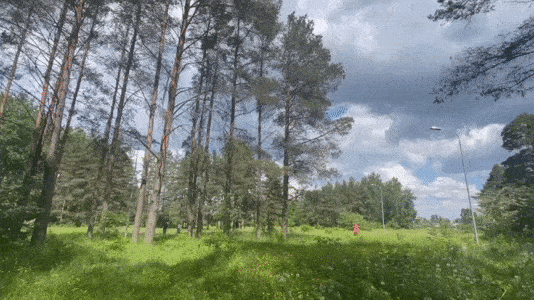Like a Garden of Eden
In her text, the author builds a dialogue with the viewer inviting them to join the described movement practices that she used in her laboratory of inclusive performance. The laboratory was organized at the Center for Curative Pedagogics in Pskov in June and September 2021.
My name is Lena Kholodova. I am an independent artist, with my current research focusing on the subjects of inclusion and postcolonial discourse in a contemporary socio-cultural context.
In June and September 2021, I participated in an inclusive laboratory as a curator. The laboratory was held at Pskov’s Center for Curative Pedagogics and involved students from the City Cultural Center’s theater studio Ya I Ty (Me and You), along with neurotypical participants selected through an open call.
Within the laboratory, we explored the theme of the “Garden of Eden” through performative practices such as presence training, somatic sessions, movement, observation, kalarippayattu, as well as through joint meals, walks, and travels.
The questions we asked ourselves included: what is love? Friendship? Peace? How does the wind speak? What do I see right now?
As well as those that arose in the process of our joint practices and observations, another was: what is time and how to measure it? Is there time in the Garden of Eden?
During one of the practices—an exercise borrowed from the avant-garde butoh dance—we found that there is no time for neurodiverse participants.
I suggest doing this practice together.
Stand against a wall, note down the hour, and walk slowly towards the other wall during that time. Watch your breath and the movement of thought.
Participants were asked to do this practice for fifteen minutes. We stood in a line in the middle of the room and slowly walked towards the wall.
Many reached it much earlier.
After lunch, we go out into the forest. We go to listen to the music of trees, the wind, the singing of birds, the rustle of the grass.
We are not limited in time here.


Someone lies down under a tree; someone hugs its trunk; someone goes out into the meadow. Everyone is dancing.
To repeat this practice with us, you need to go to the forest or park in your neighborhood. Take your time to get started. First, find a place, your place.
Then listen. Perhaps it will take some time to hear the music of space. When you hear it and feel ready, allow these sounds to dance with your body. Observe—but don't judge. Dance as much as you wish.

On the penultimate day of the first session, we went to Izborsk. The city is 31 km away from Pskov, so we set off right in the morning.
I sat with Andrey, and we talked all the way. He said that he didn’t want to go to the sea, that he used to live in another city, and about his parents who are gone. He lives with his sister now.
We arrived at the hillside in Izborsk and went down.
We laughed and joked, made a pit stop, and had a picnic. We ate buns, bananas, drank tea, and talked.
Nastya had badminton with her and sometimes played with Ilya.

After the picnic, we went to the ravine behind the church and ancient cemetery. We gathered at the edge of the ravine and shouted our names into it.
Then we sang and danced in the meadow.
To dance with us, first, lie down on the ground, feel it with your whole body, especially with that part of it that touches the ground.
And, just as if we were a blade of grass, we will start growing into the sky from the ground. Slowly and unhurriedly, noticing everything around. We can talk about time here, for example, take fifteen minutes for this, but you can rely on whatever you feel for yourself.
Growing up, your body-blade dances with the air to the songs of birds and the buzz of flies. It stretches to the sky and clouds, stretches to the sun.
Then the body-grass-blade begins to wither, sinking and returning to the ground as slowly.
We lie on the ground again, feeling it with every cell, breathing the earth, listening to it.


The second session took place in the fall. It was a cold September, which I’d been very much looking forward to. We often went to the forest in the rain and collected waste, which we subsequently washed and played music on.
Lion, elephant, fish, horse—Andrey says, that's what we did in the classroom.
All participants enjoyed the ancient practice of kalarippayattu, especially because its poses are the names of wild animals.

Each of us had pets, whom we also knew by name.
The utopia of the Garden of Eden was made possible for a short while and changed us all.
There also arose the question of what the practice is as such, and the illusory division on the teacher and student, neurodiverse and neurotypical, on sixty or fifteen minutes revealed itself.
Now I ask myself how to create conditions for the growth of “Gardens of Eden” in the current socio-cultural context, how to get the entrance key and not lose it.
The laboratory plemya kotoroe ya (the tribe that I am) was held on the basis and with the support of the Center for Curative Pedagogics in Pskov in June and September 2021.
I would like to thank everyone who made this project possible: my co-curator Seryozha Chekhov, director of the Center for Curative Pedagogics, Tsarev A. M., head of the Ya i Ty (Me and You) theater studio, Sukhareva O. Yu., project participants Irina, Natasha, Edik, Sveta, Nastya, Ilya, Galya, Andrey, Nadya, Marina, Tanya, Andrey, Vadik, Dima, Katya, Milana, Dasha, Polina, and Diana.

